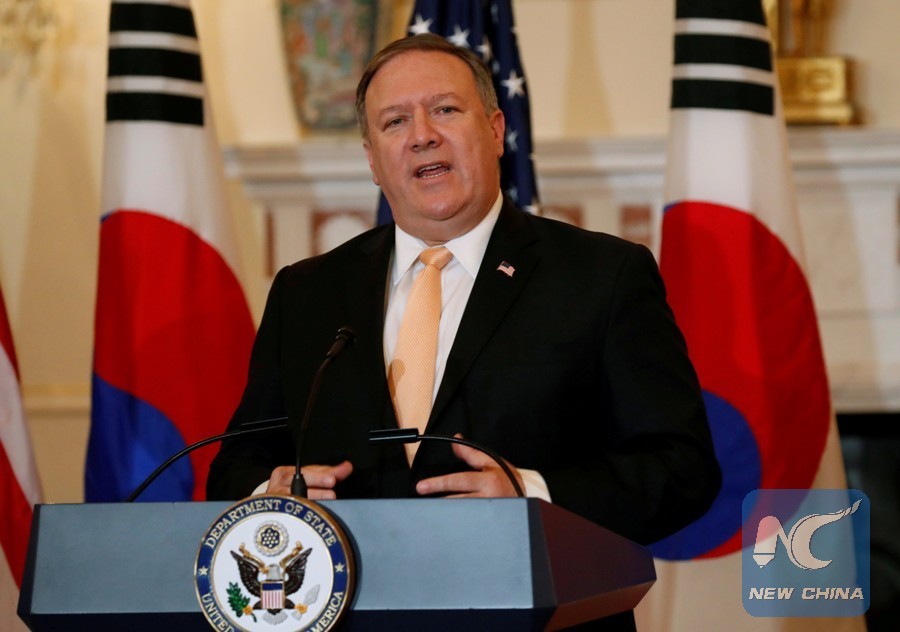
U.S. Secretary of State Mike Pompeo speaks during a joint press availability with South Korean Foreign Minister Kang Kyung-wha (not shown) after their meeting at the State Department in Washington, DC, U.S., May 11, 2018. (REUTERS/Kevin Lamarque/File Photo)
WASHINGTON, May 13 (Xinhua) -- U.S. Secretary of State Mike Pompeo said on Sunday that the United States had failed to reach an agreement with the European nations on the historic Iran nuclear deal.
He made the remarks in an interview with Fox News, after U.S. President Donald Trump withdrew from the deal on Tuesday. The U.S. exit, together with its threaten to sanction companies economically involved with Tehran, has sparked outrage in Europe.
French Finance Minister Bruno Le Maire said earlier that Europe should not accept that the U.S. is the "world's economic policeman," or become the U.S. "vassals" that "obey decisions taken by the United States while clinging to the hem of their trousers;" Rather, Le Maire asked, "or do we want to say we have our economic interests, we consider we will continue to do trade with Iran?"
Pompeo said "I worked hard over the short time I've been the secretary of state to try and fix the deal. We couldn't reach agreement with our E3 partners," referring to Britain, France and Germany, all signatories of the Iran deal.
"The wealth that was created in Iran as a result of the JCPOA drove Iranian malign activity ... President Trump's withdrawal is denying them that wealth, denying them the resources to continue their bad behavior, to take the money away from them," he said.
However, he added the U.S. "sanctions regime that is now in place is very clear about what the requirements are," hinting that Washington is prepared to go after European companies and allies if they try to continue to do business with Iran.
While announcing his exit decision, Trump said the United States will impose "the highest level" of economic sanctions on Tehran, adding "any nation that helps Iran in its quest for nuclear weapons could also be strongly sanctioned by the United States."
U.S. Secretary of the Treasury Steven Mnuchin also noted in an announcement that "sanctions will be reimposed subject to certain 90 day and 180 day wind-down periods. At the conclusion of the wind-down periods, the applicable sanctions will come back into full effect. This includes actions under both our primary and secondary sanctions authorities."
For Iranian side, President Hassan Rouhani said on Sunday that Tehran will remain in the international nuclear deal if the country's interests are secured by other parties to the agreement,
"If the remaining five countries in the deal live up to their commitments and guarantee Iran's interests, the agreement will survive," he said during a meeting with visiting Sri Lanka President Maithripala Sirisena.
The U.S. withdrawal from the 2015 deal was "a violation of morals," he said.
By pulling out of the deal, the United States also undermined the diplomatic efforts to international issues, he added.

